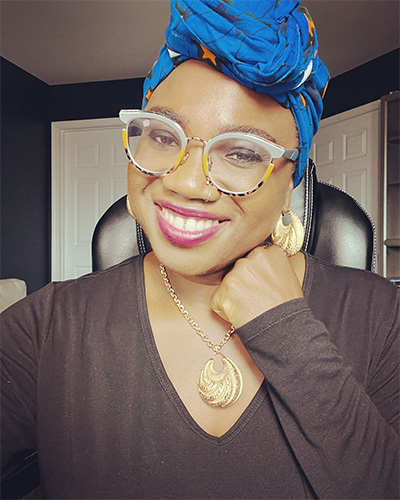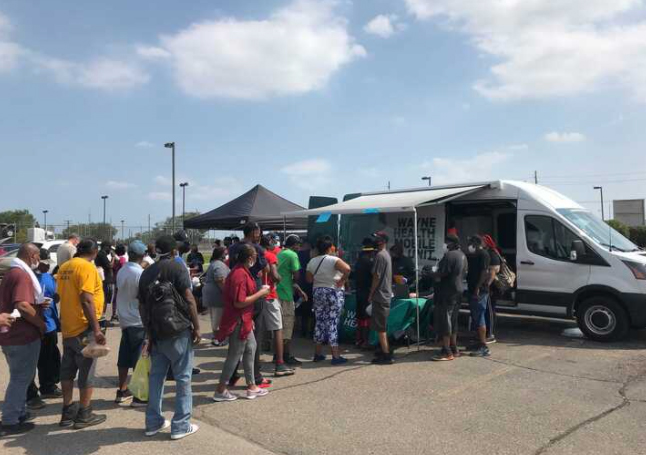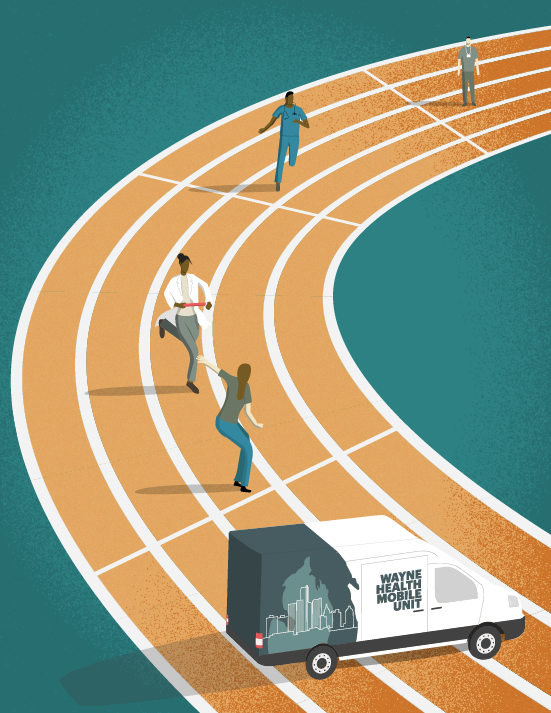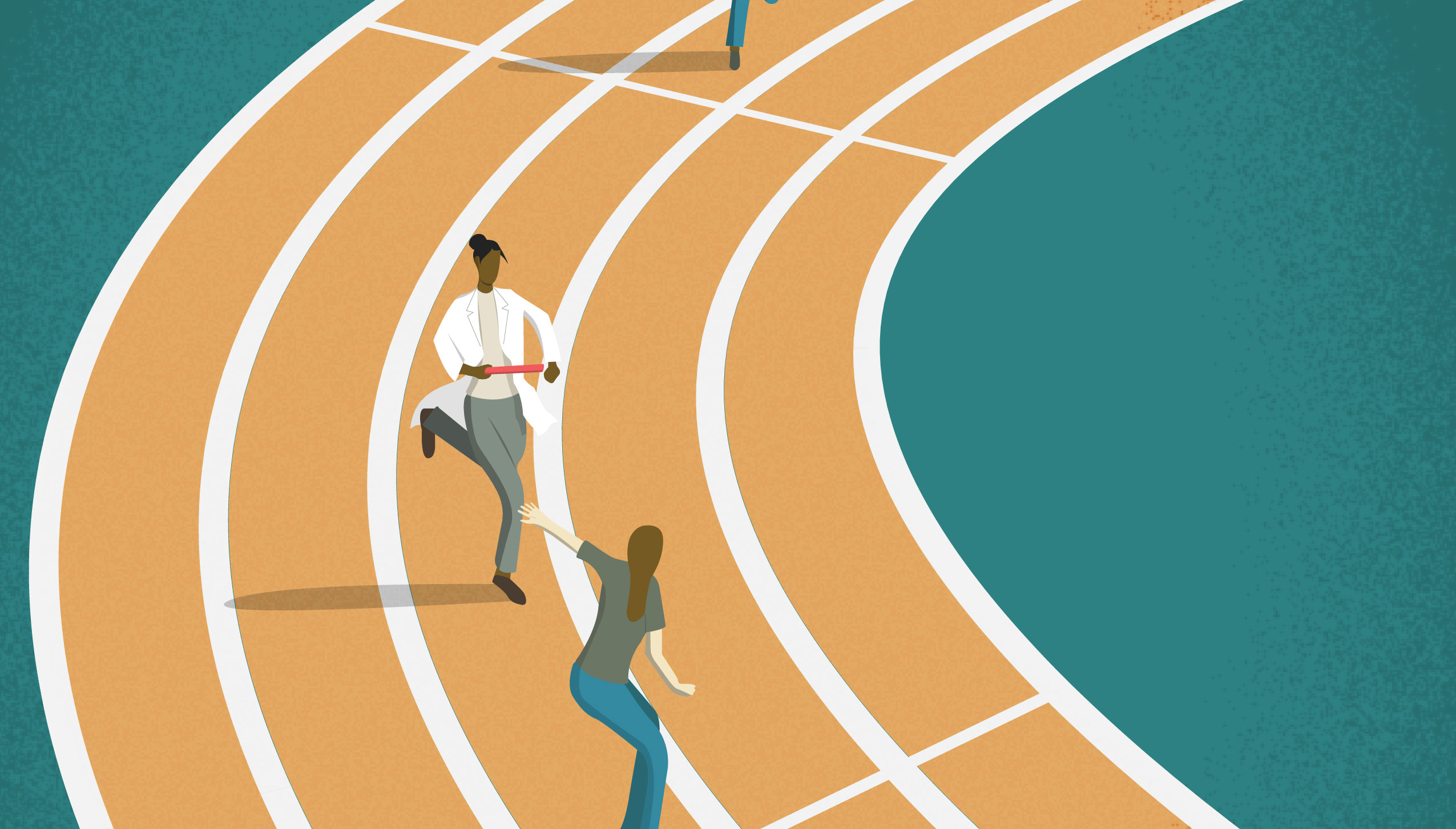This series highlights the consortium's talented researchers and community partners and their work on health equity. We take a deep dive into who they are, what makes them passionate about their work, and more.

Where are you from?
I was born in Nigeria, am a Nigerian-American woman. I usually say I was born in Nigeria and baked in Detroit. And so I was born in Nigeria. My father is a physician scientist and my mother is a community leader and educator. So this is what made all that this is.
What kind of research do you do?
So my research is implementation. I call it liberation implementation science. And so essentially it's really the study of how do we take evidence-based interventions, evidence-based solutions and implement it, make it happen on the ground and understand what knowledge is that generating so that we can scale up and so that we can ultimately transform society. I mean, the big picture is to create a better world, is to create a world that is more just, more equitable, move loving, more kind, more generous so that we all can thrive.
How did you know you wanted to be a physician?
I always knew I was going to be a physician because a), I look like my dad, I act like my dad, I quack like my dad; I am my dad. And so I just was going to follow in his pathway, but also I was in love with sciences. I was in love with this idea of asking a question, devising a method and approach to answer the question and then test if that question is true. It is in a way the exploration of what is true and again, in service of making the world better, making the community better.
What diseases is your center studying?
So our focus is on cardiovascular health and so inside of that is hypertension and then the risk factors as Achieve Cessation is focusing on, which is cigarette smoking. The other projects are looking at heart failure, chronic kidney disease and other sort of complications of cardiovascular health. So these will be some of the areas of concern, but they all live inside the bucket of cardiovascular health.
Which projects are you part of at ACHIEVE GREATER?
We have three projects in the ACHIEVE GREATER and I inform the others as well because of the lens of social determinants of health, of which that's my area of expertise, one of my areas of expertise and the role of community health workers as well. So really working with community health workers, training and clinical support, and devising the social determinants of health protocols, and then providing support for all the personnel that are involved with the entire enterprise. But my chief affiliation is with Project 1, which is called Achieve Cessation, where we are taking advantage of a unique opportunity where Detroit has the largest population of African-American folks who smoke tobacco. And so we know that smoking of tobacco, cigarette smoking, is one of the chief drivers for poor cardiovascular health outcomes. We understand that there are drivers to why that is so in terms of why we have such high rates of smoking that are, again, rooted in toxic stress of surviving structural systemic interpersonal racism.
And so our question is well can we bring down these rates of smoking among a population that have been made vulnerable due to systemic injustice by doing two things. One, having a pharmacy-driven model for nicotine replacement that can work one-on-one with our patients, our participants, rather, and two, working with community health workers to implement a process that we have termed PAL2, which is essentially the personalized, pragmatic model of addressing lifestyle changes that incorporates the social determinants of health. So if we can do these things where we are really identifying those social drivers and intervening on them by connecting them with community resources, if we are working with a community health worker, we’re working with our pharmacists. And to do this, can we bring down those rates and by so doing, bring down the rates of cardiovascular disease, specifically hypertension, down the road.
Your team is using mobile vans, called Mobile Health Units, to provide care for those without reliable transportation. Can you describe what's novel about the Mobile Health Units?
So the Mobile Health Unit is novel in the ways that we’re using the concept in an urban city like the City of Detroit. It’s also super novel in the grand scheme of things. We have Mobile Health Units around the country and throughout the world. Actually, in many parts of the world they’ve been using it before the U.S. or North America caught on.

However, the central role a Mobile Health Unit has played in the city during the pandemic by bringing care to the people and then linking them to the built healthcare system is definitely novel and important; also by integrating community health workers within the Mobile Health process and operations to address more than just the physical or clinical concerns of our communities, but their social concerns as well is also novel. And that evolved over time to start addressing cardiovascular health, other infectious disease preventive care and of course the social determinants of health working with our community health workers.
And so being able to go into the communities and bring care to folks and then create solutions around how we link them back to the built healthcare system becomes a novel approach, a different way to ask and answer the question as to how do we ensure people have access to quality, culturally affirming, holistic care that addresses their issue not as something to blame them and put the burden of solution on them, but that we can be partners with them in creating solutions to best support them so they can live their healthiest life.

What are the goals of the project?
We have a shortage of physicians and healthcare professionals, right? Everything doesn't have to be driven by the physician, and we really need to redefine health and healthcare and public health. We need to move to this integrated model where we have our pharmacists and our community health workers and social workers and nurses and all members of the healthcare system to be empowered and equipped to intervene on the health of our communities. A community’s health is not going to depend on physicians alone. It needs this holistic integrated model to actually move the needle of health. So this is one key point that we’re hoping to show and prove the impact of you don’t necessarily need the physician to be at the center of all this work. We need to devise models that integrate all members of the healthcare family, shall I say, in order to move the needle.
What is your favorite part of doing this research?
My favorite part is working with the people. I love working with our community health workers. I love learning from them as much as hopefully I teach. I love providing the support. I’m a teacher at heart so anything I do, I’m always needing to give context and background and I find that people feel respected, valued and seen when I do that, rather than just answering a question, but to say "Why that is?", and give that context. And they seem to grow through that process and then I also grow because of every time we give, we receive.
What would you do if you weren’t a researcher?
I would be on Broadway and singing my little heart out at the top of my lungs and dancing and acting my little butt off.
What’s your favorite Broadway play?
Lion King. And then I watched Fela! It’s another one. There’s so many I want to watch but those two would be great.
Are you part of a production?
I hope to be part of a production. I’m not currently. One day we’ll get there but while the kids are small, it will be a little bit too much. I have a 9, 7 and soon to be 5-year-old so they’re still on the younger end and I barely juggle it all at this juncture. But as they get older I hope to be part of productions. So right now I just sing and dance wherever, usually in the most inappropriate places. And that's what I do. I sing at my patients and they’re like, “Dr. Opara, I mean, stop.” And I sing at my trainees, I sing at my kids, I sing at anyone who doesn't want to hear me, not that I have a great voice. I don’t want you to think I can sing but I love it enough to do it anyway and it just be what it is and have people deal with it.
How do you want to influence the next generation and what mark do you want to leave?
I would say two things. One is that you show up as yourself in these spaces. In this part of the world, in your American region and knowing the history of how the especially biosciences but also many of the social sciences involved, it is very white, very patriarchal, very deficit-based and then more recently, capitalist driven. And so oftentimes these spaces were also created on the foundation that people that look like three of us are not human enough, and are somehow inferior to white male-bodied, land-owning people, right? And so we that are scientists and researchers and physicians, and the list goes on in these spaces, we get to show up and show that that is not the way or the only way or even the way to be into science. You can have piercings, you can have tattoos, you can be funky, you can wear your traditional clothes, you can wear jewelry and makeup and be beautiful and be whatever it is, and you are still a goddamned superstar scientist or researcher, clinician, what have you and show up in all your cultural realness, and it’s okay.
And then two is that we can use our voice to create a better world where all of us thrive and we can all thrive when the most marginalized is no longer marginalized, when the most minoritized and disenfranchised is no longer that and our science should be a tool towards achieving that end. And that's good, that's a good thing, it’s a right thing, to be and to do.
Ijeoma Opara, MD is a double-board certified internal medicine and pediatric physician, an academic physician and physician scientist, and a physician scholar and activist. She is also an Assistant Professor at the Wayne State University School of Medicine and a Co-Investigator at the ACHIEVE GREATER Center.
Dr. Opara hosts a podcast called the Antiracism and Action Roundtable and co-founded the Global Health Program at Wayne State University.
